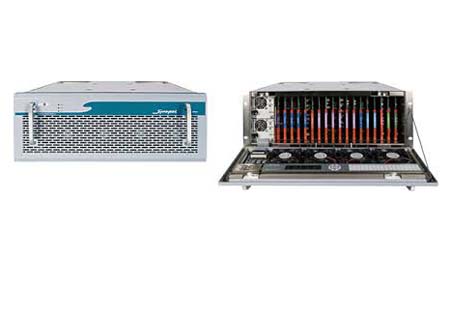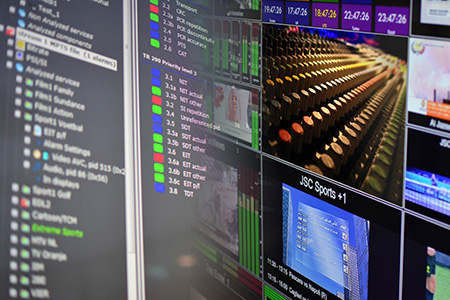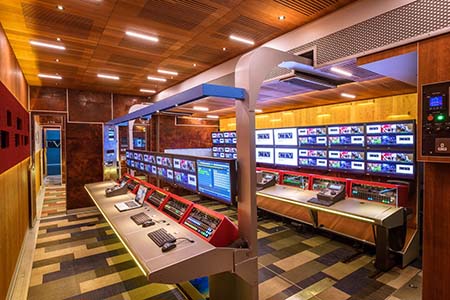Axon Digital Design is introducing the Synapse NIO440, an Ethernet/SDI bridge that can help broadcasters negotiate the transition from SDI to IP.
 Axon Digital Design is introducing the Synapse NIO440, an Ethernet/SDI bridge that can help broadcasters negotiate the transition from SDI to IP.
Axon Digital Design is introducing the Synapse NIO440, an Ethernet/SDI bridge that can help broadcasters negotiate the transition from SDI to IP.
On show at NAB 2017 the 8-channel bi-directional Synapse NIO440 can handle AVB/TSN, S2022 and the new upcoming standard S2110 (TR03). It also supports S2059 (PTP) for synchronisaton and timing. Any other future standards are also within its capability and compatibility will be achieved by future firmware upgrades.
The NIO440 is based on the Axon in-house developed Neuron core that handles all conversions between Ethernet/IP and SDI. The Neuron core can easily be extended with new formats and standards and therefore offers unchallenged flexibility to the user. A key differentiator of the NIO440 is that it allows the use of multiple video formats and Ethernet/IP standards at the same time in any combination. It even allows easy conversion between the different Ethernet/IP standards. The Neuron core will also be the heart of all new and upcoming Ethernet/IP relared products from Axon, which includes a poweful UHD and IP capable modular multiviewing solution.
The industry is already gearing up for an IP future that will be more convenient, flexible and cheaper than SDI, says Axons CEO Jan Eveleens.
However, during this transition period there is huge demand for products that can help broadcasters bridge the gap between the two technologies. As a customer-focused company, Axon is committed to delivering products and solutions that broadcasters need. Our development of Synapse NIO440 was inspired by conversations with key customers who wanted a workable link from 3G/HD-SDI to uncompressed Ethernet video transport and de-centralized routing.
The Synapse NIO440 provides a 4-in/4-out gateway into a distributed switching network, plus a 1GigE connection to a shared data network. Routing between inputs and outputs is achieved through a Layer-2 network based on a star topology. Individual switches can be linked by one or more 40Gb/s connections and all connections are made using Fiber-Optic cables.
Establishing a connection between NIO440 cards is simply a matter of entering information about the source into the card you wish to route the signal to. A source can be routed to as many destinations as the network infrastructure allows. A route can be manually set up using the modules lower level interface. By using a Control System (such as Axons Cerebrum control and monitoring solution) to detect, name and provide user-friendly interfaces, routing can be as simple as using a traditional cross-point router. A Control System interfaces to the cards through the SFR racks Ethernet port, which also provides status monitoring and control of other card parameters such as audio embedding and de-embedding.
Ideal for a wide range of applications, the Synapse NIO440 can be used as a point to point video/audio/data connection (using standard fiber-optic cables or SMPTE camera cables, avoiding CWDM infrastructures and cost) and a point to multi-point routing and distribution solution using IT switches.
Broadcasters requiring fixed building to building links between their main base and their remote studios can use Synapse NIO440 for a range of connections such as camera feed to the production Control room, prompt and return video to the studio, two-way communication, control and corporate networks and on-air lights. Similar connections can be made between Outside Broadcast vehicles and remote commentary and camera positions, especially when they are located some distance from the production vehicle.
Synapse NIO440 also works in Metropolitan Area Video Switching, where broadcasters use different buildings spread across a city and require real-time video signal connections between them. They may also need to extend access to their video network to local companies offering support services. With the wide-spread installation of dark-fibre, it is now possible for a user to self-provide a switched video network. The use of Ethernet allows the Broadcasters core router to move to a distributed system, extended between buildings and third party premises, linked together by point-to-point fibre. The same connections used for video signals can also be used for the exchange of IP traffic such as files, e-mails, etc.










































































